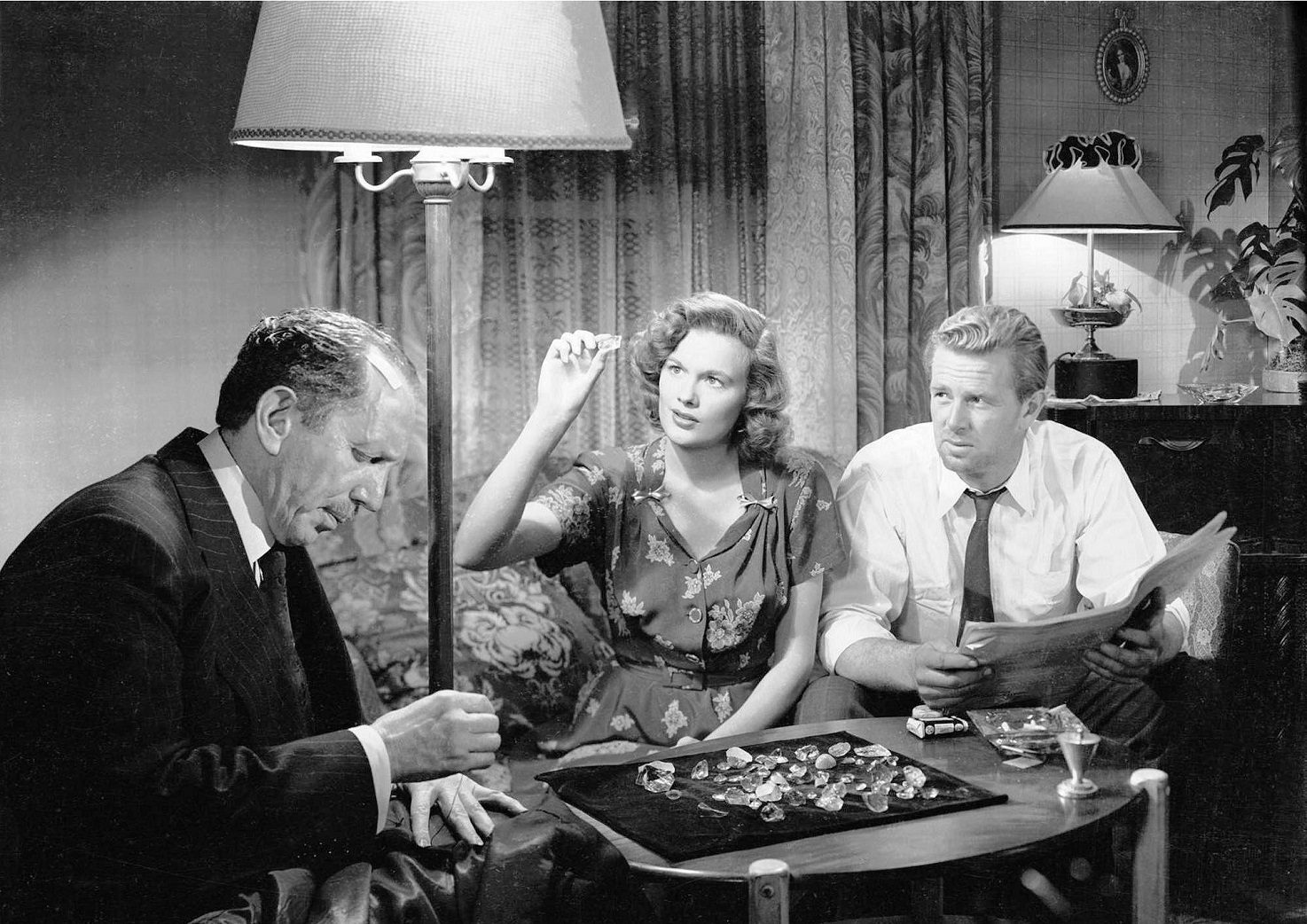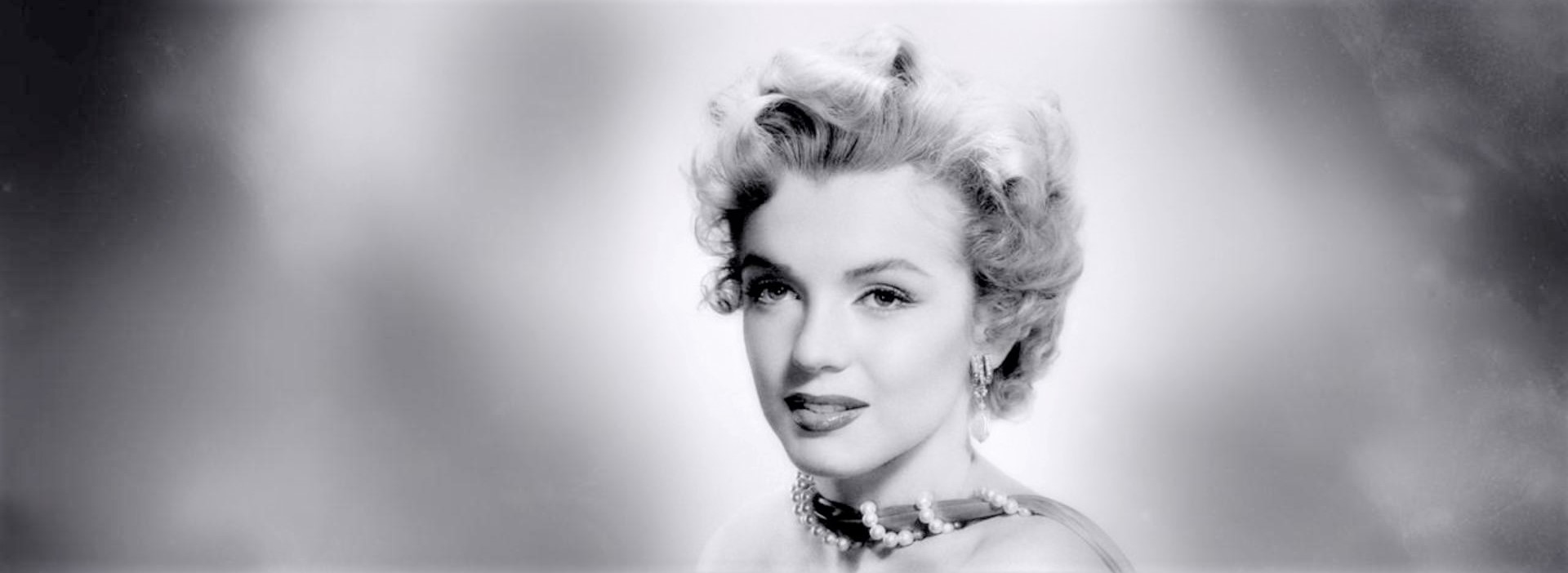The Asphalt Jungle
23 May 1950
Marilyn’s Impression Trilogy, Movie No. 1
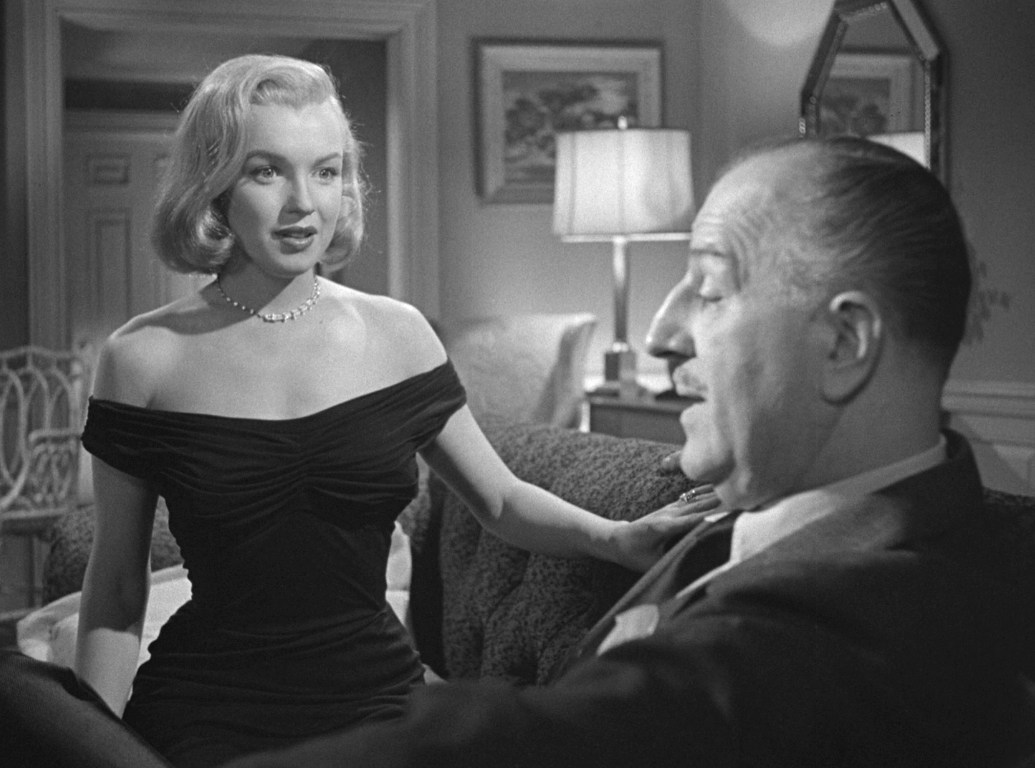
Erwin “Doc” Riedenschneider spent seven years behind prison walls for committing a burglary; and as soon as the authorities release him, he heads to Cobby’s bookie parlor, hoping to make contact with the Big Fixer, criminal attorney, Alonzo “Lon” Emmerich. After Doc presents his perfectly devised plan to burglarize a large jewelry store, scoring one million dollars in jewels and precious metals, the corrupt attorney agrees to finance the gang and suggests that he might even act as the fence for the stolen gems. With the help of Cobby and fifty-thousand dollars in cash, Doc assembles a gang of professional criminals: Louis Ciavelli the safe cracker or box man; Dix Handley, the hooligan, the muscle in case of trouble; and Gus Minissi, the transportation. While the actual heist is successful, unforeseen problems develop during the getaway and due to a failed double-cross by Emmerich and a confession by Cobby, the plan disintegrates and ends badly for the criminals.
Acclaimed as the first crime movie in which the story unfolds from the perspective of the criminals, John Huston allows us to participate in his criminal’s daily struggle to survive, in their private interactions, in a few of their vulnerable, more emotional moments and in the gratification of their addictions and vices. According to Doc, one way or another, we all work for our vice. John Huston apparently wants to convince us that there is little or no difference between the criminal and the noncriminal. Throughout the movie, many parallels are drawn between the average citizen and the citizens occupying the city beneath the city, beneath the asphalt jungle. Like many average citizens, John Houston’s criminals are merely professionals just doing their designated jobs. After all, as the corrupt attorney, Lon Emmerich, observes: what is crime but a left-handed form of human endeavor?
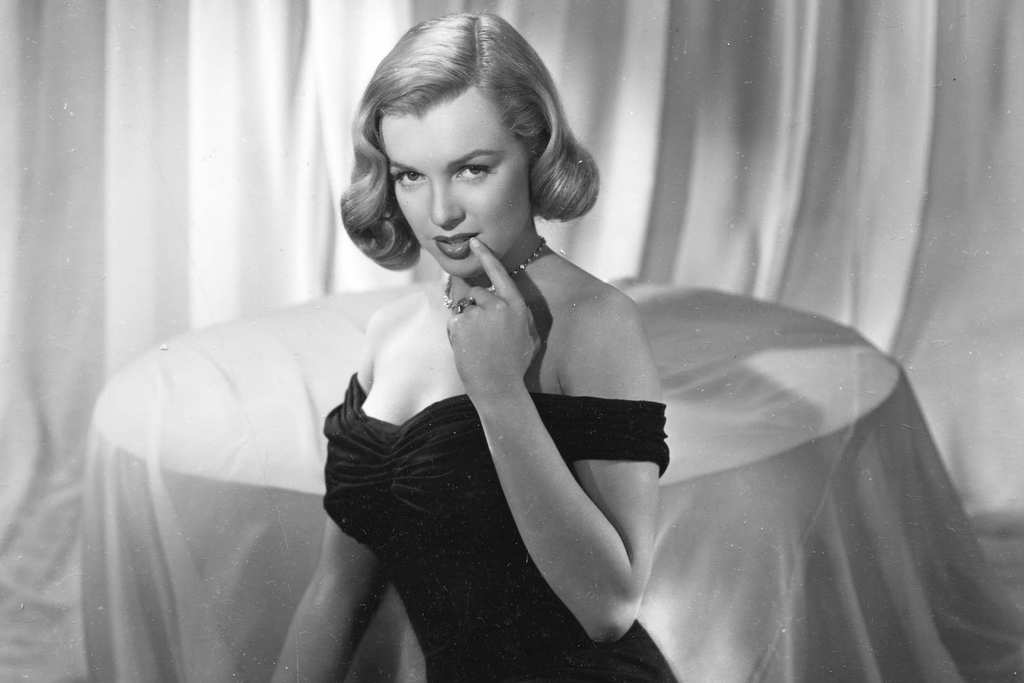
Huston and his co-screenwriter, Ben Maddow, create characters who are dangerous but pitiable and wicked but likable. Their likability allows us to accept their fundamental humanity. Like most of us, the criminals have their hopes and dreams as well. Dix Handley, for example, simply wants to score enough money so he can get back to Kentucky and rebuy the horse farm his family lost during the Depression. First thing I do when I get there, he tells us, I take a bath in the crick and get this city dirt off me! He is, after all, just a country boy who wants to go home. Even Emmerich wants a different life; but instead of choosing to change himself and his behavior, he chooses the coward’s way: he chooses to flee. And like most women, both Doll and May simply want the attention and the love of the men in their lives.
But the decadence, the depravity of the criminals are also exposed and examined. From the opening montage of Dix evading a police prowl car, analogies are drawn between the criminals and the grotesque world they inhabit, as if the ugliness of the littered urban landscape, the dilapidated, unkempt buildings has manifests itself in the physical ugliness of certain characters. Gus Minissi is a disfigured hunchback and Cobby’s constantly sweaty face is moderately disfigured by terrible acne scars, as is Ciavelli’s; and it appears that Huston adroitly framed Emmerich in certain scenes just to emphasize his huge and hooked nose. But their main deformity is a moral disfigurement by their ugly vices and addictions: gambling and alcohol, a sexual obsession with young women, their criminal existence. Lt. Ditrich is the worst, the corrupt cop who plays both ends against the middle, whose vice is the money he extorts from Cobby, and no doubt other low level crooks like Cobby, and the money he essentially steals from the taxpayers while shirking his responsibilities and his oath to protect and serve. Their moral corruption creates this overwhelming sense of constriction, perversity and doom.
And yet, even with their ugliness and their vices, certain members of the criminal mob are not without redeeming qualities. They live within a certain odd code of honor. Gus, who feeds and protects stray cats, is a loyal friend to Dix. To Gus, perhaps, Dix is not unlike a stray cat, something he needs to protect. While Dix may not be a humanitarian or a lover of men, who he doesn’t object to robbing or murdering, Dix is also Gus’ friend. After the heist, Dix becomes Doc’s admiring buddy and protector; and with Doll, he displays his softer hooligan, allowing her to stay in his apartment after the clip joint where she worked was closed by raiding COPs. He just advises her not to get any ideas about romance between them. As Dix happily and wistfully recounts boyhood memories of bucking horses and life in Kentucky, we glimpse his humanity, his anger, his pride and the deep pain caused by the loss of the family farm. He believes his luck is bound to change so he can live that bucolic life once again. In spite of his moral wretchedness, pulling for him to get back to Kentucky and his horse farm seems easy. Even the old letch, Doc, exposes a softer side when he engages Ciavelli in conversation about his child and wife and admits that he envies the safe cracker. Doc appears to want a family life with some normalcy, like Dix.
Cobby and Lt. Ditrich, particularly Ditrich, appear to be void of any compassion or fundamental human decency. Cobby makes his illegal living off the rotten luck of gamblers while Ditrich extorts money from and protects Cobby’s illegal enterprise. They exploit those around them and they exploit each other. In the aftermath of the heist, when the plan is unraveling and the police are tightening the net, Ditrich beats the whimpering bookie into submission. Ditrich thinks that appearing to solve the case will save his job. Cobby confesses because he’s a coward. He and Ditrich do not live by any code of honor.
Considered to be a classic film noir by many noir experts, The Asphalt Jungle explores desperation and alienation, the lack of any real meaning to life, the absurdities of existence, the influence of chance and fate, and the estrangement of some persons from the more common or normal morality. While it certainly has the dark and grimy realism, the violent and hard-boiled characters common to the noir genre, it lacks one basic element that most noir films have: the femme fatale, the beautiful scheming siren who leads men to destruction.
Reviewers want to designate Angela Phinlay as the femme fatale, but she doesn’t beguile or lead Uncle Lon to his destruction: his self-loathing leads him to his tragic end. In fact, he calls Angela some sweet kid. Angela is not a virgin schoolmarm; and she may exploit Emmerich in a sense, just like he exploits her. The women act out of loyalty and express concern for their men. Even Emmerich’s wife worries about the criminals with which her husband must deal. Each is naïve, placing their trust in untrustworthy men. Doll loves Dix, almost desperately, and for sure, May loves Emmerich like Maria loves Ciavelli. Perhaps, in a way, even Angela loves Emmerich, or at least loves what she believes her Uncle Lon to be. However, not one of the women qualifies as a femme fatale. We might question their judgment and their choice in men but they certainly aren’t scheming, at least not in an evil way, and they certainly aren’t dangerous.
In response to their women’s concern and love, the men behave with a deplorable disregard for their welfare. To Dix, Doll is like an obligation and therefore, a nuisance, a status she passively accepts. Only when she realizes, near the end of the movie, that Dix cannot escape the police without her, does she act decisively to ensure that he doesn’t leave her behind. By then, it’s just too little and too late. The most pathetic of the three women is Emmerich’s wife, May: she deals with her husband’s disregard for her by feigning illness, retreating to her bed like an invalid. She believes this manipulative tactic will rekindle Lon’s love for her. But in the end, Lon acts in a way suggesting that he is incapable of real love, capable only of cowardice.
Huston directly contrasts the physical beauty and softness of the women with the coarse appearance, the relative ugliness of the men. Is Huston suggesting that women represent good and the beauty of life while the men represent the bad and the ugly? Are women simply more pure, or am I simply seeing more than Huston intended? Besides, the women possess some traits that tend to contradict such a conclusion; but the contrapuntal use of their faces, the soft against the coarse, is interesting and effective.
Equally effective is the black and white cinematography which garnered Harold Rosson an Academy Award nomination. The slightly static, claustrophobic scenes and the tight camera work reflect the static and constricted nature of the criminal’s lives; and the musical score echoes their dreary and somber, sad existence. Huston keeps the movie’s pace brisk, the dialogue taut and tense. He received an Oscar nomination for best direction; and along with Ben Maddow, the Academy recognized the screenplay with a nomination for both writers. Perhaps the only sequence in the movie that seems slightly out of place is Commissioner Hardy’s sanctimonious and moralizing speech for the press after Emmerich’s suicide and Doc’s arrest.
Without the constraints of the Production Code, I wonder how the movie would have ended? Would Houston have allowed some, or even all, of the criminals to escape justice, escape with the jewels? — the symbol of the power and the wealth of the city above the city beneath the city. Perhaps. But the Production Code would not allow that to happen: in the fifties, crimes could not be glorified and criminals had to be punished. So after we become invested in their plight, we must be forced to witness their ultimate and inevitable destruction, if for no other reason than to issue a warning: crime does not pay and death is the wages of sin. In the end, the plan must unravel. As distant sirens fill the night sky and Ciavelli is in his bed, dying from a gunshot wound, Maria observes: sounds like a soul in Hell.
Briefly, it appears as if Doc just might escape punishment; but ironically, his obsession with young females seals his fate at a roadside diner. It also appears as if Dix might escape when he and Doll head for Kentucky by car but Dix’s bleeding gunshot wound begins to weaken him. Debilitated and hallucinating, once he reaches his boyhood home, he collapses and dies in a brightly lit pasture surrounded by white fences and horses, a cruel implication that Dix has figuratively repurchased and quite literally bought the farm. Adding a final irony, a movie which began with a grimy, urban landscape, littered with dilapidated and poorly kept buildings, ends with a sunlit, bucolic setting. Is Huston trying to suggest, that in spite of the tragic ending, there is hope? Hope for whom? But then, in the fifties, upbeat endings were mandated by the studios and often suggested by the Production Code.
The movie’s ensemble cast of experienced and talented character actors deliver excellent performances. Sam Jaffee’s mesmerizing portrayal of Doc garnered an Academy Award nomination for Best Supporting Actor. Sterling Hayden renders Dix Handley as a methodical, angry and violent anti-hero with whom no one should ever trifle. Jean Hagen imbues Doll Conovan with ditz and sweetness and even some resolve near the end of the movie. James Whitmore portrays Gus Minissi as if his back, although humped and bent, is made of steel; and Louis Calhern is nearly flawless as the smarmy, duplicitous and corrupt criminal attorney, Alonzo Emmerich.
The supporting cast members also deliver commendable performances: James McIntire as the moralistic Police Commissioner, Hardy, Marc Lawrence as Cobby, the nervous and alcoholic bookie, Barry Kelly as the corrupt police detective, Lt. Ditrich; Anthony Caruso as the safe cracker, Louis Ciavelli, Teresa Celli as Maria, Ciavelli’s clueless wife, Dorothy Tree as Emmerich’s bed-ridden, allegedly ill wife, May and finally, in a minor but a significant role for her, her first in a major movie, Marilyn portrays Emmerich’s young and beautiful paramour, Angela Phinlay. Over the movie’s running time of 112 minutes, Marilyn is on-screen for a total of 4 minutes and 52 seconds. She appears in two scenes, primarily with Louis Calhern and one of which has two distinct parts.
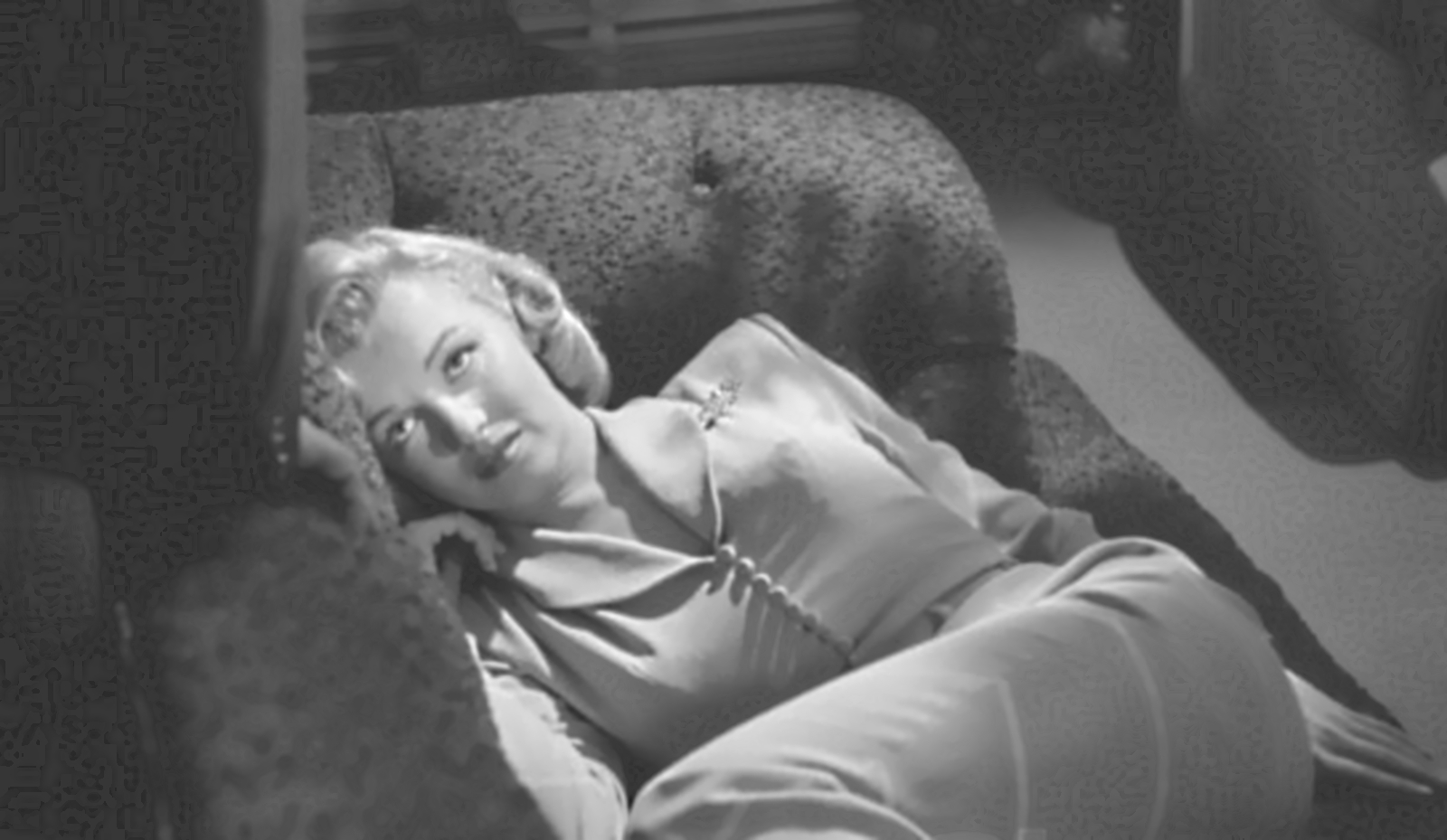
In Marilyn’s first scene, one primarily of introduction, Angela is asleep on a sofa when Emmerich enters the room, pauses and looks down upon her. She awakens and expresses displeasure with his odd stare. She is soft, almost feline, stretches herself and smiles. In an almost paternal manner, Uncle Lon suggests that she retire. She responds by nodding her head in agreement, rises, approaches and then bends to kiss him good-night. He embraces her and pulls her down into his lap. They share a brief kiss that does not suggest any sort of love or even sexual desire. Their separation appears, in fact, to be caused by a gentle and subtle push-away by Angela. As they separate, the expression on their faces, conveys an unspoken but palpable uncertainty with each other. After their tenuous kiss, she stands, softly touches his hand, just like a young woman might touch the hand of an elder male relative. As she walks toward a bedroom, Emmerich once again refers to her as some sweet kid. Angela looks back at him as she stands briefly in the doorway at the end of a hall. Her body language is not sexual. Mostly expressionless, appearing slightly forlorn, she slowly closes the bedroom door. Emmerich picks up Angela’s shoe, smiles whimsically at it and then places a telephone call to an associate. They talk while Emmerich inspects the small shoe.
In part one of Marilyn’s second scene, Angela is facing Uncle Lon, whose left profile, his enormous nose is to the camera. She is attentive, wide eyed and lovely, wearing a strapless black dress, shoulders exposed. The very embodiment of youthful excitement and beauty, she is waiting for Uncle Lon to speak. Earlier in the movie, Uncle Lon had directed her to provide an alibi for him and she dutifully complied. She knows that Uncle Lon is about to deliver a reward for that service. When he proposes a trip, she blinks her eyes delightfully. Angela is a young woman who knows how to play the game. Where to? she asks. Uncle Lon tells Angela that she can go anywhere so she scurries into the hallway and returns with a magazine. Lon chuckles. Cuba, he says, now that’s not a bad idea. Angela asks Uncle Lon to imagine her on the beach in her green bathing suit. Yipes! she exclaims and then tells her Uncle:
I almost bought a white one the other day but it wasn’t quite extreme enough. I mean, don’t get me wrong. If I really went in for the extreme extreme I woulda bought a French one. Run for your life girls. The fleet is in. O, Uncle Lon, am I excited. Yipes!
Angela certainly loves herself; and her reference to the arrival of the fleet has sexual implications. Easy and available women, prostitution has long been associated with the arrival of the fleet. While probably not a street walking prostitute, Angela’s comment about the fleet implies that she has experience with more men than she might want known, than she might pretend. In an earlier scene as Emmerich and Bob Brannom waited for the jewels to arrive, Brannom provided a hint when he implied that Angela was not visiting her sister, despite what she told Lon. Besides, one could conclude that her extreme swimsuits, meaning sexy and provocative, are a means of advertising herself and possibly enticing sexual partners.
With her head lying in Uncle Lon’s lap, she begins to talk excitedly about the palm trees and the ocean but when the doorbell rings and the pounding begins, Angela becomes frightened. There is a wistful, faraway look in Uncle Lon’s eyes. Perhaps he is imagining Angela wearing her green bathing suit surrounded by admiring sailors on a romantic Cuban beach. Or perhaps he realizes that his fall from grace is just about to reach bottom.
The Police Commissioner, along with two detectives and two uniformed officers greet Uncle Lon when he opens the door. He invites them in and while they are standing in the foyer, Angela hurries off-set in the background. Once in the living room, the commissioner reveals the purpose of his visit and he orders one of the detectives to get the young lady. While the detective is going to get Angela, the commissioner informs Emmerich that Cobby confessed.
Angela is initially defiant with the door-pounding detective. He threatens to break it down. Haven’t you bothered me enough tonight, you big banana head? She asks after she opens the door. Just try breaking my door and Mr. Emmerich will throw you out of the house. Emmerich is a dead duck, the detective reveals; he won’t be throwing anyone out of the house. Angela becomes tentative and compliant after she hears the stern authoritative voice of the police commissioner. Do I have to talk to him, she asks and begins to flirt with the detective. Her eye lids droop, she begins to pout and move her body suggestively. Can’t I just talk to you? she asks seductively. Angela’s self-preservation machinery is now in full function mode.
The second part of the scene begins as the detective escorts Angela back into the living room where the police commissioner questions her about the alibi she provided for Emmerich. He warns her that she could go to jail for complicity. She turns her face to Emmerich. Uncle Lon? she says timidly, asking partly for protection and partly for guidance. Emmerich tells her to tell them the truth. She admits that she lied, then breaks down and weeps. Her weeping is not all that convincing. The commissioner orders her to give a new, truthful statement to the detective. As she passes Emmerich, she grasps two fingers of his left hand and apologizes: I’m sorry, Uncle Lon. I tried. He responds: You did pretty well, considering. Uncle Lon knows that she wanted to be loyal, be faithful to the lie, but considering the situation, what could she do? His acknowledgment that she did pretty well is also his forgiveness.
But her next question reveals what interests Angela the most, attests to her lack of real feelings for Emmerich and reinforces that she is concerned only with herself, her gratification. What about my trip? she asks in a soft, plaintive voice. Is it still on? Uncle Lon assures her: Don’t worry, baby, you’ll have plenty of trips. As Angela sits down with the detective and prepares to give her revised statement, Emmerich goes into his study to telephone his wife; but with the sad look of a man resigned to a terrible fate, he takes a pistol from his left hand desk drawer and like a coward, commits suicide.
Each scene was brief and she spoke just a few lines, yet her medium for creating the character was not limited to her dialogue. Remarkably, considering her lack of experience and training, she was able to use her wonderfully expressive face and alluring eyes to create the realistic and memorable portrait of a self-centered, narcissistic but beautiful young woman.
Additionally, Marilyn’s interaction with her much older counterpart, Louis Calhern, was equally remarkable. He was fifty-five years old when he appeared in The Asphalt Jungle. Marilyn was a mere twenty-four. The Asphalt Jungle was Calhern’s forty-ninth appearance in a movie. Marilyn’s appearances had been confined to only a few disparate scenes and she delivered lines in only two of those; her resume had but one authentic starring role: Ladies of the Chorus. Louis Calhern was an experienced and highly respected actor in 1950. Marilyn was virtually unknown; but her fine performance alongside Calhern revealed an actress, while still inexperienced and very young, was equal to the challenge and more than held her own in two difficult and demanding scenes, their brevity notwithstanding. Frankly, there was little or no difference between the acting prowess displayed by Louis Calhern and Marilyn.
In future movies during her career, Marilyn would find herself sparring with other heavy weights from her chosen profession. She would acquit herself well and she would, on more than one occasion, deliver a knockout blow and performance.
